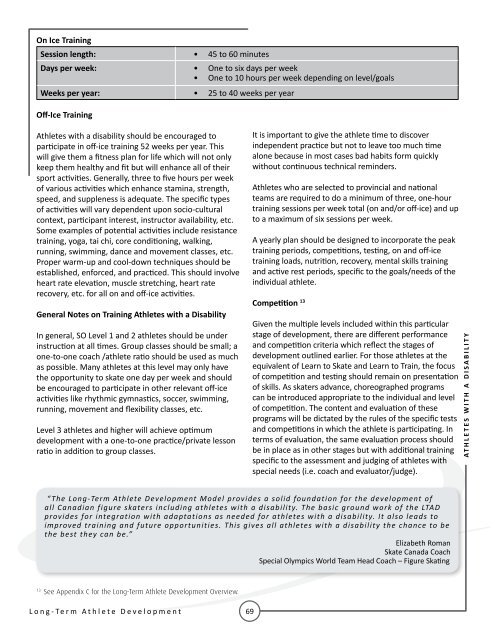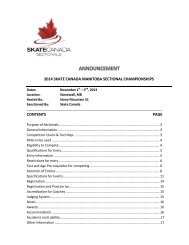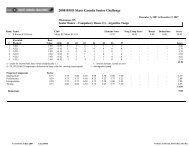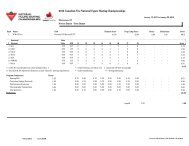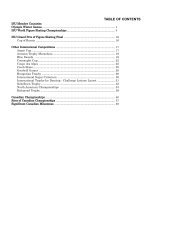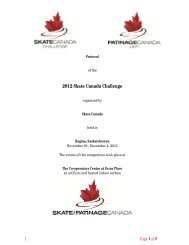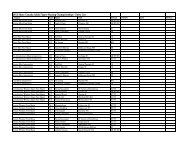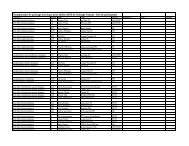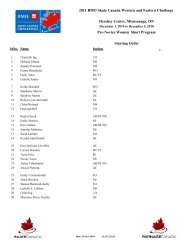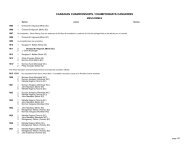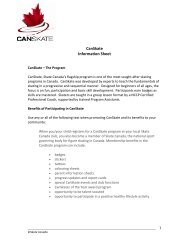LONG-TERM ATHLETE DEVELOPMENT - Skate Canada
LONG-TERM ATHLETE DEVELOPMENT - Skate Canada
LONG-TERM ATHLETE DEVELOPMENT - Skate Canada
Create successful ePaper yourself
Turn your PDF publications into a flip-book with our unique Google optimized e-Paper software.
On Ice Training<br />
Session length: • 45 to 60 minutes<br />
13 See Appendix C for the Long-Term Athlete Development Overview.<br />
L o n g - Te r m A t h l e t e D e v e l o p m e n t<br />
865 Sheord Road, Ottawa, Ontario K1J 1H9<br />
Days per week: • One to six days per week<br />
• One to 10 hours per week depending on level/goals<br />
Weeks per year: • 25 to 40 weeks per year<br />
Off-Ice Training<br />
Athletes with a disability should be encouraged to<br />
participate in off-ice training 52 weeks per year. This<br />
will give them a fitness plan for life which will not only<br />
keep them healthy and fit but will enhance all of their<br />
sport activities. Generally, three to five hours per week<br />
of various activities which enhance stamina, strength,<br />
speed, and suppleness is adequate. The specific types<br />
of activities will vary dependent upon socio-cultural<br />
context, participant interest, instructor availability, etc.<br />
Some examples of potential activities include resistance<br />
training, yoga, tai chi, core conditioning, walking,<br />
running, swimming, dance and movement classes, etc.<br />
Proper warm-up and cool-down techniques should be<br />
established, enforced, and practiced. This should involve<br />
heart rate elevation, muscle stretching, heart rate<br />
recovery, etc. for all on and off-ice activities.<br />
General Notes on Training Athletes with a Disability<br />
In general, SO Level 1 and 2 athletes should be under<br />
instruction at all times. Group classes should be small; a<br />
one-to-one coach /athlete ratio should be used as much<br />
as possible. Many athletes at this level may only have<br />
the opportunity to skate one day per week and should<br />
be encouraged to participate in other relevant off-ice<br />
activities like rhythmic gymnastics, soccer, swimming,<br />
running, movement and flexibility classes, etc.<br />
Level 3 athletes and higher will achieve optimum<br />
development with a one-to-one practice/private lesson<br />
ratio in addition to group classes.<br />
Phone 613.747.1007 I Toll Free 1.888.747.2372 I Fax 613.748.5718 I Toll Free Fax 1.877.211.2372<br />
69<br />
It is important to give the athlete time to discover<br />
independent practice but not to leave too much time<br />
alone because in most cases bad habits form quickly<br />
without continuous technical reminders.<br />
Athletes who are selected to provincial and national<br />
teams are required to do a minimum of three, one-hour<br />
training sessions per week total (on and/or off-ice) and up<br />
to a maximum of six sessions per week.<br />
A yearly plan should be designed to incorporate the peak<br />
training periods, competitions, testing, on and off-ice<br />
training loads, nutrition, recovery, mental skills training<br />
and active rest periods, specific to the goals/needs of the<br />
individual athlete.<br />
Competition 13<br />
Given the multiple levels included within this particular<br />
stage of development, there are different performance<br />
and competition criteria which reflect the stages of<br />
development outlined earlier. For those athletes at the<br />
equivalent of Learn to <strong>Skate</strong> and Learn to Train, the focus<br />
of competition and testing should remain on presentation<br />
of skills. As skaters advance, choreographed programs<br />
can be introduced appropriate to the individual and level<br />
of competition. The content and evaluation of these<br />
programs will be dictated by the rules of the specific tests<br />
and competitions in which the athlete is participating. In<br />
terms of evaluation, the same evaluation process should<br />
be in place as in other stages but with additional training<br />
specific to the assessment and judging of athletes with<br />
special needs (i.e. coach and evaluator/judge).<br />
“ The Long-Term Athlete Development Model provides a solid foundation for the development of<br />
all Canadian figure skaters including athletes with a disability. The basic ground work of the LTAD<br />
provides for integration with adaptations as needed for athletes with a disability. It also leads to<br />
improved training and future opportunities. This gives all athletes with a disability the chance to be<br />
the best they can be.”<br />
Elizabeth Roman<br />
<strong>Skate</strong> <strong>Canada</strong> Coach<br />
Special Olympics World Team Head Coach – Figure Skating<br />
A T H L E T E S W I T H A D I S A B I L I T Y


